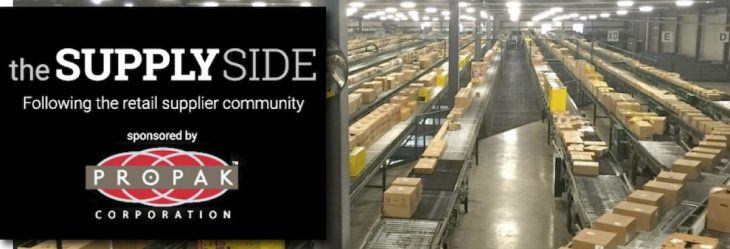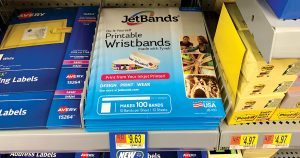The Supply Side: Walmart gives wristband maker Artemax a go at brick-and-mortar
by March 6, 2019 4:17 pm 1,134 views

Wisconsin-based Artemax Inc. is one of Walmart’s Open Call success stories in the retailer’s efforts to grow and support U.S. manufacturing jobs. The wristband manufacturer based outside Milwaukee employs about 100 people in its printing and wristband-making operation.
Nate Olson, director of sales, said the company had never sold in a brick-and-mortar retail store before its partnership with Walmart. He said the company makes customized rubber wristbands and Tyvek bands, which are sold throughout the medical and entertainment industries. Artemax patented a process that allows Tyvek bands to be personalized by consumers using an inkjet printer. The product JetBands was developed with the hope of pitching to retailers.
In 2017, Artemax heard about Walmart’s Open Call for U.S. manufacturers, so the company submitted an application. Olson said they were blown away by the notion they could get a 30-minute appointment with a buyer for a goliath like Walmart, just by asking.
“We went to Bentonville and not only got the buyer meeting but we learned so much about the company, heard from executives, and they made us feel comfortable,” Olson said.
While retail was new for Artemax, the product was not. Olson said it was designed to sit on retail shelves, and Walmart was the first to hear the company’s pitch in the summer of 2017. Olson said they left Bentonville with two commitments from Walmart to buy JetBands and non-branded colored Tyvek wristbands.
“We went from 0 to 60 in a flash,” Olson said. “Holy cow, we started getting emails from Walmart for stuff to do the next day to help us as a new supplier. Walmart was patient with us through the process, and they have been a great partner.”
Artemax had to ramp up production in order to fill the first order for Walmart. Forty-two trucks of products headed to distribution centers and then out to nearly 3,000 stores by May 2018. To be exact, it was 2,988 stores for the JetBands product and about 1,800 stores for the non-branded colored Tyvek wristbands, which are each sold in the office supply section of Supercenters nationwide.
Olson said because of the size of the initial Walmart order, Artemax had to hire nearly 10 additional employees and add a second shift to ensure all the production run was completed in a timely fashion. He said distribution had to fill and package the product according to Walmart specifications. He said when the trucks pulled out, there was a big relief but also panic, hoping they would arrive on time and get out on the shelves.
“When they got to our local stores we rushed out to see they were on the shelves, and we hoped they had made it to all the other stores,” Olson said. “We figured we would hear in a day or so if they didn’t. We saw sales start to happen, and we knew the product had made it to the shelves. We made a social media push and tried to get the word out the best we could that our wristbands were on Walmart shelves, but there isn’t really anything flashy or that exciting about wristbands. Nonetheless, they kept selling.”
He said the company just got word from Walmart that sales were good enough for them to be added to the new modular set that occurs this spring, which means the products will be around for at least one more year. Walmart also increased the number of stores for the non-branded Tyvek bands from 1,753 to 2,871 starting in April.

“We are thrilled to be on the shelf again and get more stores for our secondary product,” Olson said, “We have not yet tried to sell this to other retailers. We don’t have an exclusive deal with Walmart, but we just wanted to ensure they got our full attention as we are still learning our way around the retail business.”
He said forecasting demand for a new product like JetBands can be tricky, but somehow the forecasts were nearly spot on for the first year. Sales were consistent and strong enough to get more stores for the other product as the company starts year two with Walmart.
Olson said Artemax has not yet undergone a factory audit from Walmart, but that should happen in the next few months. He said the products also had to go through a rigorous testing protocol by a third party as part of the Walmart requirements.
“The products passed the tests and Walmart has also reached out to us about the possibility of making two other products for them,” he said. “We hope to continue those talks when we meet with our buyer in Bentonville this spring for our annual review.”
Olsen said of the raw materials used by Artemax for the wristbands, they manufacture or are sourced in the United States. The Tyvek is sourced by DuPont, with whom the company has a longtime relationship. He said the Walmart order did help to grow Artemax business with DuPont.
Olson said the company worked with a marketing firm in Milwaukee to design its packaging for the JetBands product. It was the first go at retail packaging for Artemax. When presented to Walmart, it passed muster with no real changes, except to remove the hole needed for hanging on pegs.
The products are sold on the office supply aisle and not in party supplies. Olson said that was the Walmart buyer’s decision, which turned out to be the right one. While the items are often used for entertainment purposes, they are essentially printable labels that compare to items by Avery. Olson said there are other event items such as tickets and cash boxes that are also sold on the office supply aisle.
Chris Zehner, marketing director for Artemax, said while Walmart is the only brick-and-mortar retailer selling the wristbands, the company has been selling on Amazon since 2011. In 2016, they became eligible for Prime Delivery fulfilled by Amazon. She said 3.5 million wristbands are sent to Amazon each week for fulfillment and Artemax has about 70% of that market share.
Olson said the company has two verticals — entertainment and medical/healthcare. He said the entertainment business is the bread and butter and represents the bulk of revenue and sales. He said Walmart helped to grow that segment’s sales exponentially in the past year. The medical/healthcare segment is smaller but also growing.
He said selling to Walmart has been exciting and sometimes hard, but Artemax strongly applauds the retailer’s efforts to support U.S. manufacturing jobs.
Cindi Marsiglio, the face of Walmart’s U.S. Manufacturing initiative, has said the investment Walmart has committed — to purchase $250 billion of new products over 10 years — is supporting hundreds more manufacturing jobs.
Harry Mosier, founder of Reshoring Initiative, has widely applauded Walmart’s efforts to buy more U.S.-made products. He estimates 131,000 jobs were added to the U.S. manufacturing sector last year, jobs that came onshore. He said that number is down from the record 170,000 jobs added in 2017. He expects the tariffs and trade concerns to keep numbers down a bit this year as well, but longer-term, better trade deals should be net positive for U.S. manufacturing.
–––––––––––––––
Editor’s note: The Supply Side section of Talk Business & Politics focuses on the companies, organizations, issues and individuals engaged in providing products and services to retailers. The Supply Side is managed by Talk Business & Politics and sponsored by Propak Logistics.
